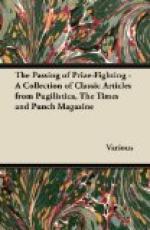[Illustration: A PILLAR OF THE CHURCH.]
What happened at Jutland? After four years’ cogitation the Admiralty does not appear to have emerged from the state of uncertainty into which it was plunged by the first news of the battle. In February last Mr. LONG announced that the official report would be published “shortly,” but then the German sailors began to publish their stories, and these not very unnaturally differed from the British accounts. So now My Lords have decided to leave Sir JULIAN CORBETT’S Naval History of the War to unravel the tangle and inform Lords JELLICOE and BEATTY (who, according to Sir JAMES CRAIG, are quite agreeable to the proposal) exactly what they and their gallant seamen really did on that famous occasion.
Thursday, October 28th.—There being no Labour Party in the House of Lords the Emergency Powers Bill passed through all its stages in a single sitting. Even Lord CREWE did not challenge its necessity in these troublous times, but Lord ASKWITH was a little alarmed at the possibility that “an unreasoning Home Secretary”—as if there could ever be such a monster!—might be over-hasty to issue Orders in Council, and so exacerbate an industrial dispute.
A long list of “reprisal” Questions—mercifully curtailed by the time-limit—was chiefly remarkable for Sir HAMAR GREENWOOD’S emphatic declaration that he was not going to accept the statements even of English newspaper correspondents against the reports of officials “for whom I am responsible and in whom I have confidence.”
Assuming that the House of Commons is, as it ought to be, a microcosm of the population, it will be some time before this country goes “dry.” Members of all parties pressed upon the PRIME MINISTER the necessity of relaxing the regulations of the Liquor Control Board. His suggestion that an informal Committee should be set up to make recommendations to the Government was received with cheers, and there was much amusement when Mr. BOTTOMLEY and Lady ASTOR, who do not, I gather, quite see eye to eye on this subject, promptly nominated themselves for membership.
As the PRIME MINISTER is popularly supposed to be not averse from appearing in the limelight, especially when there is good news to impart, it is pleasant to record that he left to Sir ROBERT HORNE the congenial task of announcing that an agreement had been reached with the Miners’ Federation, and that the coal-strike was on the high road to settlement. The terms, as stated, seemed to be satisfactory to all parties, and the only mystery is why the negotiators should have required the stimulus of a strike before they could arrive at them.
* * * * *
THE DOWNING OF THE PEN.
A little difference of opinion on the moral aspect of strikes which has been ventilated in The Daily News has caused one correspondent to write: “Let us suppose that Mr. SILAS HOCKING regards the serial rights of one of his novels as worth L250. Suppose I offer him L100. What does he do? He withholds his labour; and quite right too!”




